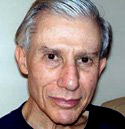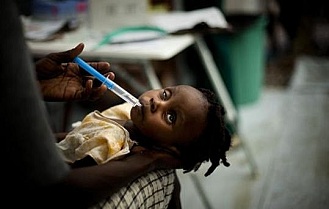Haiti's Cholera Epidemic Sparks Outrage
In early November, thousands of Haitians rallied for President Jean-Bertrand Aristide's return and presidential hopeful Jean-Henry Ceant in the November 28 elections, one rigged by banning 14 political parties, including Fanmi Lavalas, by far the most popular.
Ceant founded Aimer Haiti (Love Haiti), "a movement uniting and integrating human-centered (principles) and committed to the pursuit of the ideals of unity, solidarity and fraternity to build a new Haiti on the basis of shared responsibility, social justice, peace and economic progress for all."
He's also a notaire (notary), businessman, community leader and philanthropist, the only candidate most Haitians support, whether or not he'll deliver on promises if elected. Aristide did, Preval for a while, then sold out the public that backed him. Given Washington's iron fist and no shyness using it, populist governments everywhere are at risk, especially in deeply impoverished countries like Haiti.
For now, a raging cholera epidemic takes top concern, officially causing over 1,000 deaths and around 15,000 hospitalizations. However, these figures way understate the true crisis, one or more estimates believing the true count is several-fold. On November 14, Operational Biosurveillance said it confirmed statistics of up to 400% undercounting.
"There is no question of under-reporting." At one-fourth the true crisis, "we now have nearly 60k cases shedding pathogen into the environment. We believe the true statistic to be closer to more than 100k based on the degree of under-reporting. It is extremely difficult to estimate the true scale of this epidemic now. (It's) grossly uncontrolled, uncontained, (and) has exceeded public health capacity to investigate and assess every site reported and every sample received."
Disturbingly, the entire country is affected, including the densely crowded capital, Port-au-Prince, with up to 1.5 million in makeshift accommodations on city streets and wherever they found space, living in the open under dismal sanitation conditions.
On November 14, New York Times writer Randal Archibold headlined, "Cholera Deaths Up in Haiti, With Worst to Come," saying:
"Several epidemiologists have said the disease has not peaked and will likely worsen and" spread, UN health officials "estimating about 270,000 may be sickened in the coming years."
The true potential minimally exceeds a million, eventually causing many thousands of deaths, preventable because cholera is easily treated if done properly on time. However, little Western aid was provided, virtually nothing from Washington despite over $1.1 billion pledged. Also, Haiti's medical infrastructure is woefully inadequate, besides poor sanitation and most Haitians having no access to clean drinking water.
Overall since the January earthquake, Washington obstructed what little aid arrived. Then cholera and Hurricane Tomas flooding, making conditions on the ground worse than ever, indifferent rich nations doing little to help.
Haitians finally reacted, riots erupting in Cap-Haitien on Haiti's north coast. On November 16, Al Jazeera headlined, "Haiti cholera protests turns violent," saying:
Clashes with MINUSTAH forces killed at least two Haitians. "Protesters, who hold Nepalese UN peacekeepers responsible for the cholera outbreak (from an identified Asian strain foreign to Haiti), threw stones and threatened to set fire to a (Cap Haitien) base," according to Haitian radio and eyewitness reports.
Al Jazeera's Cath Turner said the situation was "brewing for a while, (evident by) tense relations" between MINUSTAH and local people. "Back in August, a 16-year old boy was found dead - he was hanging from a tree." Haitians believe UN troops killed him. Its paramilitaries have terrorized Haiti since arriving in 2004 to support a coup d'etat regime after US marines kidnapped Aristide in February 2004, then forcibly flew him to the Central African Republic. He's now in South Africa in exile, wanting to return. On orders from Washington, the Preval government prevents it. In a recent interview he said:
"I love my people and my country, and I cannot hide it, and because of that love, I am ready to leave right now. I cannot hide it. What is preventing me from leaving, as I said earlier, if I look from South Africa, I don't know." He wants to return as a private citizen, not a head of state. "In my view," he said, "they don't want me back because they still want to occupy Haiti," and freely exploit its people and resources, of course.
Haitians demonstrate often for his return, his presence alone badly wanted, his spirit a way to infuse hope for better governance and conditions, what's so far sorely lacking. The Cap Haitien protests are unsurprising, among others expressing outrage for lack of government and UN aid. For also failing to contain the cholera outbreak. The more it spreads, the greater the anger.
On November 15, Haitian Truth.org reported that:
"Cap Haitian is closed. Schools closed. People (are) on streets throwing rocks. MINUSTAH troops (were) disarmed by Haitians. (The) airport (was) under attack. Preval is finished....Business is closed. The city is shut down. (At the airport), attempt(s were made) to burn (a) terminal underway....Much gunfire (was reported)."
Incoming aircraft were diverted. UN vehicles were being burned. Haitians demanded removal of UN troops. They fired tear gas at demonstrators. MINUSTAH's airport headquarters was burned. People say stop the election. Help children.
On November 16, Reuters also reported clashes in Cap Haitien, a local businessman saying: "The whole city is blocked, businesses and schools have closed, cars have been burned. It's chaos here." Demonstrators set fire to the Pont Neuf police station.
Al Jazeera's Cath Turner said protests so far are:
"just the beginning" of what Haitians are calling a "very strong civilian uprising against the UN in Haiti. We have been speaking to our sources on the ground in Cap Haitien, (and they're telling) us that people are on megaphones encouraging people to get out on the street and to continue telling the United Nations, 'Get out now.' "
Turner also said likely protests will happen across much of northern Haiti.
"There's been suggestions of a coordinated effort to continue these protests until the UN gets out of the country."
Since arriving in 2004, they've been hated. They're not peacekeepers. They're belligerent occupiers, reigning terror on ordinary Haitians.
From Port-au-Prince, independent journalist Ansel Herz said two Cap Haitien police stations were on fire. "Protests were (also) reported in....Hinche and Gonaives...." Scattered outbreaks have also occurred in other parts of the country, including in Port-au-Prince near the presidential palace. Potentially they may break out anywhere, given the level of frustration and anger over desperate conditions and inadequate aid, especially by the UN and rich nations able to provide it.
On November 11, Doctors Without Borders (Medecins Sans Frontieres) highlighed the crisis saying "All of the hospitals in Port-au-Prince are overflowing with patients, and we're seeing seven times the total amount of cases we had three days ago." In deeply impoverished Cite Soleil, in northern Port-au-Prince, the number rose from 30 five days previously to 216. "People are coming from everywhere throughout the city, slums and wealthier areas."
The soaring need far outstrips the ability to serve it. In light of a fast-spreading crisis and inadequate outside aid, expect growing anger as the death and illness toll mounts. It's Haiti's latest cross to bear, a country beset by centuries of oppression, occupation, exploitation, neglect, deep poverty, and now cholera - an imperial epidemic likely to claim many thousands of lives, perhaps willfully targeted for removal, President Aristide, among others, saying "evidence strongly suggests" that the Asian cholera strain was imported.
Why not, given America's longstanding depopulation agenda, a model Henry Kissinger presented in his 1974 National Security Study Memorandum 200 (NSSM 200). Shaped by Rockefeller interests, it was a plan to cull unwanted, unneeded, "useless eaters" by various means, including coercive methods, withholding disaster relief, and spreading deadly diseases that kill. Haiti's now feeling the sting.
___________________________________________________________________________________

Stephen Lendman: I was born in 1934 in Boston, MA. Raised in a modest middle class family, attended public schools, received a BA from Harvard University in 1956 and an MBA from the Wharton School at the University of PA in 1960 following 2 years of obligatory military service in the US Army. Spent the next 6 years as a marketing research analyst for several large US corporations before becoming part of a new small family business in 1967, remaining there until retiring at the end of 1999. Have since devoted my time and efforts to the progressive causes and organizations I support, all involved in working for a more humane and just world for all people everywhere, but especially for the most needy, disadvantaged and oppressed. My efforts since summer 2005 have included writing on a broad range of vital topics ranging from war and peace; social, economic and political equity for all; and justice for all the oppressed peoples of the world like the long-suffering people of Haiti and the Palestinians. Also co-hosting The Global Research News Hour, occasional public talks, and frequent appearances on radio and at times television.
Stephen Lendman is a Research Associate of the Centre for Research on Globalization. He lives in Chicago and can be reached at lendmanstephen@sbcglobal.net. Also visit his blog site sjlendman.blogspot.com and listen to The Lendman News Hour on RepublicBroadcasting.org Monday - Friday at 10AM US Central time for cutting-edge discussions with distinguished guests on world and national issues. All programs are archived for easy listening.
___________________________________________________________________________________
Photo: Emilio Morenatti/ Associated Press
URL: http://www.a-w-i-p.com/index.php/2010/11/17/haiti-s-cholera-epidemic-sparks-outrage

























